India's 'macaron queen'
- Published
Pooja Dhingra tells her story of how she founded a macaron empire in Mumbai
When Pooja Dhingra tasted her first macaron she immediately knew what she wanted to do with her life.
It was back in 2008, and the young Indian woman was in Paris studying to be a pastry chef.
When her college friends realised that she had never tasted a macaron - a small, colourful circular cake made from ground almonds and filled with cream or icing - they whisked her to one of the best macaron shops in the French capital.
After just one bite, Ms Dhingra decided there and then that when she returned to Mumbai she would open her own macaron store, the first of its kind in India.
"This might sound dramatic, but I realised that yes, this is what I want to do, I want to go back to India and take macarons with me. This was my mission," she says.
Fast forward seven years, and Ms Dhingra, now 28, is the owner of three busy macaron shops in Mumbai. Another three stores will open in the city this year, and she has plans to expand her business, Le 15 Patisserie, across the country.
Yet as a young businesswoman in India, she says it hasn't always been plain sailing.
Initial problems
Ms Dhingra should have been a lawyer. But while studying law at university in Mumbai, she decided that she wanted to quit to do something more creative.
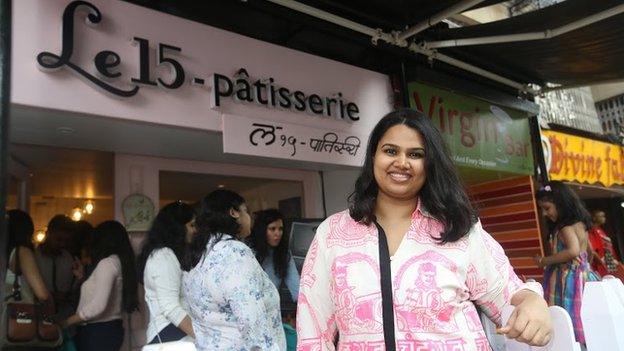
Pooja Dhingra now employs 40 people across one central kitchen and three shops
Remembering helping her mother in the kitchen during her childhood, she decided to work with food instead of legal cases.
So she convinced her parents to let her go to Switzerland to study hospitality and management.
After three years at a Swiss catering college, Ms Dhingra did one year at the well-known Le Cordon Bleu school in Paris.
Returning to Mumbai upon graduation, she set to work in her parents' kitchen on developing her own macaron recipe.
Yet with the weather in Mumbai being substantially hotter and more humid than Paris, she struggled for half a year, as the heat and humidity makes it difficult to make the delicate cakes.
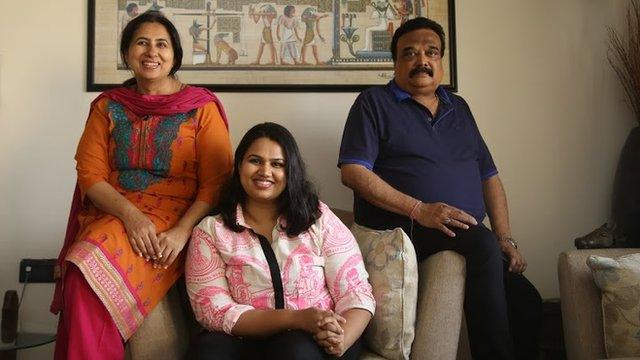
Ms Dhingra's parents supported her career change from law to food
"When I started making macarons, first at my home kitchen, it was a complete disaster," she says.
"It took me around six months of research and 60 failed recipes to finally get something right."
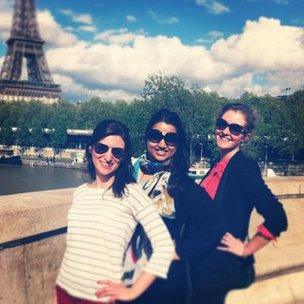
Pooja Dhingra spent one year studying in Paris
When she finally had a recipe she was proud of, her businessman father agreed to invest the initial funds she required to set up the business.
Yet being both young and female meant she faced additional challenges.
"The biggest problem was to get people to take you seriously," she says. "For example, if I had to sign a lease for a place, or buy machinery, I would have to ask my father to make these calls for me."
Ms Dhingra also found it difficult to deal with Indian red tape.
"My education in Switzerland, and working in hotels there, gave me a good idea of what working in hospitality would be like, but dealing with the bureaucracy is extremely difficult when starting a business in India."


The Boss is a series profiling entrepreneurs from around the world.

However, she eventually secured the premises for a small commercial kitchen in 2010, and began hiring and training staff. The first shop soon followed.
She named the business Le 15 Patisserie after the 15th arrondissement or area of Paris, where she lived during her time in the French capital.

Macarons
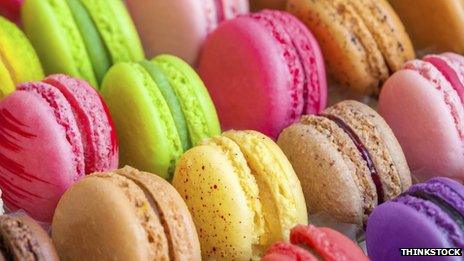
Originally French macarons are made from two discs of almond meringue, with a flavoured cream filling
Pretty shades are created by using food colouring
Often known as "macaroon" in English, though not to be confused with the almond or coconut soft cake also called macaroon, which is of Italian origin

To start to build up sales in a city where very few people knew what a macaron was, let alone have tried one, Ms Dhingra concentrated on giving away free samples.
The cakes were immediately popular, and sales soon took off thanks to positive word of mouth.
Ms Dhingra also started running classes on how to make macarons and other cakes, which gave the business a further promotional boost.
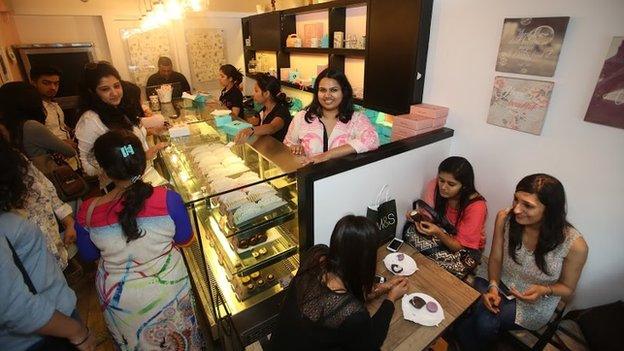
The three shops sell macarons and a number of other cakes
She has also since released a cookery book, which has been a best-seller in India.
One newspaper article called her "the macaron queen of India".
As she plans the expansion of her business, Ms Dhingra is keen to stress that she has had no additional money from her parents since her father's initial investment.
Instead, she says she has grown the business by reinvesting profits, and taking out bank loans. The shops now sell both macarons and other types of cakes, and the business employs 40 people in total.
After seeing her success, a number of other people have now set up rival macaron shops in Mumbai, but Ms Dhingra says she doesn't mind the competition.
"People can only copy what you have done, no-one can copy your ideas and vision. So I like it [the competition], it keeps me on my feet, and we always push our boundaries so that we can always stay a step ahead."
She urges other young women, both in India and overseas, to also start their own companies.
"Once you are passionate about what you want to do you will achieve it," she says. "The hours will be long and challenges will appear, but if you are passionate enough you will succeed."